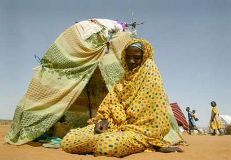Darfur villagers in danger of starvation -charity
KHARTOUM, Oct 9 (Reuters) – Thousands of villagers in Sudan’s Darfur region could starve this year because they are not receiving aid and poor rains have damaged the harvest, the head of a British charity said on Saturday.
 After a week-long trip to Darfur, Jeremy Hulme told Reuters the 1.5 million displaced to camps in the remote area were receiving food but many more people left in villages had no hope of aid and were at the risk of raids by nomadic tribes, also in need of food.
After a week-long trip to Darfur, Jeremy Hulme told Reuters the 1.5 million displaced to camps in the remote area were receiving food but many more people left in villages had no hope of aid and were at the risk of raids by nomadic tribes, also in need of food.
“The people in the camps won’t starve to death but the people out in the villages might well do,” said Hulme, who has worked in crisis situations in Africa and the Middle East for 16 years, for the Society for the Protection of Animals Abroad.
He said there was also a danger villagers may move to camps, attracted by the food distributed there by some of the more than 70 aid agencies working in Darfur.
The United Nations calls the situation in Darfur one of the world’s worst humanitarian crises.
“The last thing we want them to do is to pack it all in and come and live in the camps,” he said, adding many villagers had lost livestock, critical to their rural lifestyle.
Animals are the source of wealth and key to the livelihoods of most Darfuris.
“The food agencies should at least make an attempt to feed the people in the villages,” he said. Darfur, the size of France, has a population of about six million.
After years of skirmishes between Arab nomads and mostly non-Arab farmers over scarce resources in arid Darfur, rebels took up arms last year accusing Khartoum of neglect and of using mounted Arab militias, known as Janjaweed, to loot and burn non-Arab villages.
Khartoum denies any link to the Janjaweed, saying they are outlaws. The United States calls the violence genocide, an assertion the government rejects.
But militia raids and the ensuing fighting have driven more than 1.5 million from their homes with 200,000 encamped in the neighbouring desolate desert of eastern Chad.
Hulme said nomadic tribes, who begin to move south at the end of the rainy season, will also suffer a food shortage, as they usually bought their food from the farming villages, which had either been burnt or would not have enough to sell with the poor rains and harvest.
“Nomads will loot. They haven’t got any option. They have to eat as well,” he said.
He said this year’s rains were bad. “You need 300 millimetres (mms) (of rain) to get millet and this August they got 86 mms in (North Darfur), which is an absolute disaster.”
